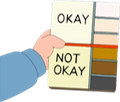40
you are viewing a single comment's thread
view the rest of the comments
view the rest of the comments
this post was submitted on 30 Aug 2023
40 points (100.0% liked)
askchapo
23225 readers
10 users here now
Ask Hexbear is the place to ask and answer ~~thought-provoking~~ questions.
Rules:
-
Posts must ask a question.
-
If the question asked is serious, answer seriously.
-
Questions where you want to learn more about socialism are allowed, but questions in bad faith are not.
-
Try !feedback@hexbear.net if you're having questions about regarding moderation, site policy, the site itself, development, volunteering or the mod team.
founded 5 years ago
MODERATORS



"Literally" is a lost cause. It means "figuratively" but Parks and Rec's Trager popularized the alternative word.
Extensive misuse of the word "literally" was a thing decades before Parks and Rec ever aired. That's why the character does it, it's poking fun of the fact that so many people use the word incorrectly and have done so for a very long time. In the 90s, there were a pair of recurring characters on MadTV named Judith and Clyde whose bit were doing the exact same thing.
I was kind of tongue-in-cheek as I said that. I agree with you mostly, except to say I think Parks and Rec may have further normalized that language mutation.
Not everything is the fault of tv shows.
Pretending that entertainment has zero effect on people that consume it is an unprovable negative and even less likely.
I didn't say it's the only influence but that it likely contributes.